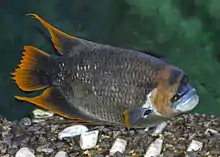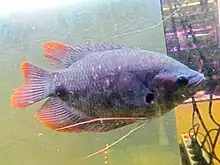| Giant red tail gourami | |
|---|---|
 | |
 | |
| Adult above, juvenile below | |
| Scientific classification | |
| Domain: | Eukaryota |
| Kingdom: | Animalia |
| Phylum: | Chordata |
| Class: | Actinopterygii |
| Order: | Anabantiformes |
| Family: | Osphronemidae |
| Genus: | Osphronemus |
| Species: | O. laticlavius |
| Binomial name | |
| Osphronemus laticlavius T. R. Roberts, 1992 | |
The giant red tail gourami (Osphronemus laticlavius) is a large species of gourami belonging to the family Osphronemidae. This endangered fish is native to the Southeast Asian island of Borneo, where only known from the Kinabatangan and Segama river basins in Sabah, East Malaysia.[1][2][3] First described in 1992 based on an aquarium specimen,[4] its exact range was not entirely certain, leading some source to incorrectly also report it from Indonesia.[5]
The giant red tail gourami is not common; in a study of the Segama River that covered eight years only a few were caught,[6] and it may already have disappeared from the lower Kinabatangan River.[7] It is replaced in Brunei, Sarawak, and North, East and West Kalimantan by the closely related O. septemfasciatus (this species may also occur in Sabah, but that is unconfirmed).[4][8][9] The common giant gourami (O. goramy) occurs at least in Sarawak and West Kalimantan, but this species is possibly not native to Borneo, instead being introduced.[4]
Description
Adults of Osphronemus laticlavius can grow up to 50 centimetres (20 in). These fishes have 10 dorsal spines, 13–14 dorsal soft rays, 11–12 anal spines and 16 – 18 anal soft rays.[5] Body is massive, laterally compressed, with an almost oval shape. The head is snub-nosed, with prominent jaw. The pectoral fins are large and rounded, while the dorsal and anal fins are slightly elongated. Even the tail is rounded and the ventral fins are threadlike. At the root of the pectoral fins appears a black ocellus. Another larger black ocellus appears on the caudal peduncle. Adults have bright red fin edges with filamentous extensions. Body colour varies from gray-blue to gray-green to brown, darker on the back.[10] Females have duller colors. Like other species of the genus Osphronemus, juveniles and adults are quite different, as in juveniles the colors are less dramatic and the bright red fins develops only with age.[11]
References
- 1 2 Low, B.W. (2019). "Osphronemus laticlavius". IUCN Red List of Threatened Species. 2019: e.T91311386A91311395. doi:10.2305/IUCN.UK.2019-2.RLTS.T91311386A91311395.en. Retrieved 20 November 2021.
- ↑ Roberts, T.R. (1994). Osphronemus exodon, a new species of giant gourami with extraordinary dentition from the Mekong. Natural History Bulletin of the Siam Society 42(1): 67–77.
- ↑ Kottelat, M. (2013). The fishes of the inland waters of southeast Asia: a catalogue and core bibliography of the fishes known to occur in freshwaters, mangroves and estuaries. Raffles Bulletin of Zoology Supplement 27: 1–663.
- 1 2 3 Roberts, T.R. (1992). Systematic revision of the Southeast Asian anabantoid fish genus Osphronemus, with descriptions of two new species. Ichthyol. Explor. Freshwat. 2(4):351–360.
- 1 2 Fishbase
- ↑ Martin-Smith, K.M., and Hui, T.H. (1998). Diversity of freshwater fishes from eastern Sabah: Annotated checklist for Danum Valley and a consideration of inter- and intra-catchment variability. The Raffles Bulletin of Zoology 46(2): 573-604.
- ↑ Hance, J. (11 June 2013). Conserving the long-neglected freshwater fish of Borneo. Mongobay.
- ↑ Rachmatika, I., Nasi, R., Sheil, D., and Wan, M. (2005). A first look at the fish species of the middle Malinau: Taxonomy, ecology, vulnerability and importance. Center for International Forestry Research.
- ↑ Sulaiman, Z., Tan, H.H., and Lim, K.K.P. (2018). Annotated checklist of freshwater fishes from Brunei Darussalam, Borneo. Zootaxa 4379(1): 24-46.
- ↑ Seriously Fish
- ↑ Animal World
